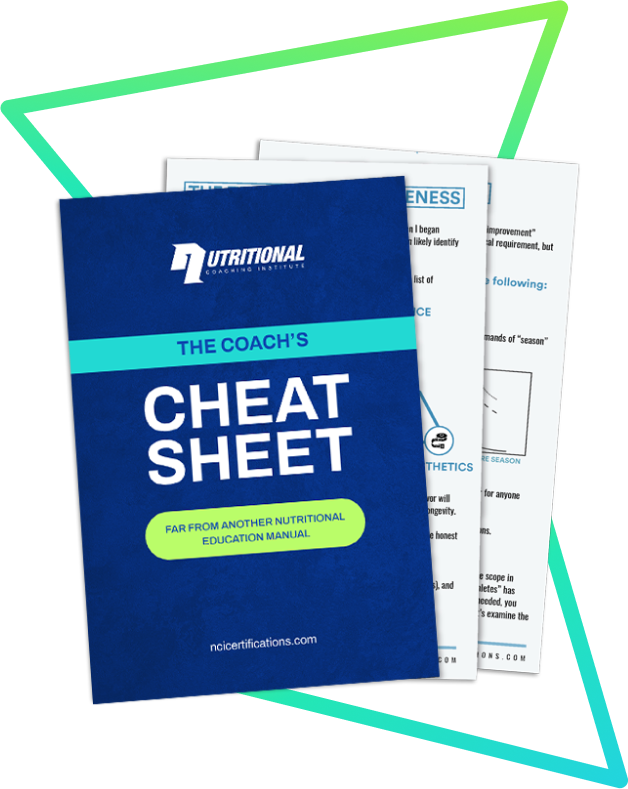“Should COLLAGEN count as protein when tracking macros? I was under the
assumption that it’s not a complete protein, therefore should not count toward
total protein??? HALP”
– Anonymous Member, March 10th, 2024
The above question was asked in the Nutritional Coaching Institute Graduates and Attendees Facebook group. The practice of not counting proteins that lack the golden halo of sources such as dairy, eggs, beef, fish, pork, and poultry is surprisingly common. Collagen is a topic of great interest to me because my first introduction to collagen was back in college (in a beginning nutrition course), where everyone was taught about high- and low-quality proteins. Low-quality proteins were deemed “incomplete” due to critically low levels of one or more essential amino acids (EAA), and collagen/gelatin was the posterboy for this concept.
Without being familiar with the body of research, it’s fair to question collagen, which is commonly portrayed as the low-quality exception among animal proteins. Poor collagen, it’s gotten a bad rap. Collagen is a uniquely fibrous structural protein, and it’s the most abundant protein in the body. Collagen is the main type of protein in connective tissue, including joints, ligaments, and tendons. Skin is a collagen-rich tissue, and even bone is about one-third collagen. So, collagen is definitely not a trivial component of the human body. To draw a rough analogy, collagen is to connective tissue what calcium is to bone tissue. There is an abundance of research consistently showing therapeutic and preventive benefits of collagen supplementation for a range of tissues throughout the body [1-3].
So, my response to the question in the Facebook group was short but sweet: all protein in your diet counts toward the total. One of the group members challenged my response since collagen is considered an incomplete protein (collagen happens to lack tryptophan). This same dismissal was applied to plant proteins in general, due to their generally inferior anabolic potential compared to animal proteins. It’s true that not all proteins are created equal. Not all proteins have the same structural & functional characteristics, and not all proteins can elicit the same anabolic response, and not all protein sources have the same effects on long-term health. However, in a diet consisting of a mix of predominantly high-quality proteins, it’s best to count the protein from all sources. All protein sources contribute various amino acids, nitrogen, and of course calories. More concrete illustrations (with references) to come.
From a practical standpoint, not counting various protein sources you deem inferior would create a tracking dilemma if your goals dictate specific targets of carbohydrate and fat. Where would you categorize ‘inferior’ proteins? Would you shove them into the carb allotment, the fat allotment, or some combination of both? And how would you determine which proteins make the cut and which do not? Plant proteins are a common target for this type of dismissal. It’s true that gram-for-gram, animal protein tends to be of higher quality (in the sense of having a greater EAA content). However, once total daily protein intakes in resistance trainees are at or beyond 1.6 g/kg, meaningful anabolic and ergogenic differences between omnivorous and vegan diets become questionable, as seen in a recent 12-week trial by Hevia-Larrain & colleagues [4]. This lack of difference in muscle size and strength gains between an omnivorous diet and a vegan diet occurred despite the vegan diet having significantly lower EAA content. Note that a deeper dive into this study, along with all the nuances and caveats, is available in the February 2021 issue of my research review.
Dismissing collagen is similar in principle to the folly of not counting plant proteins. While collagen lacks tryptophan (and is thus called an “incomplete protein”), it’s higher in proline, glycine, and hydroxyproline than other “complete” proteins. This is what makes it unique in terms of connective tissue support. Furthermore, many folks are simply unaware of the body of research showing collagen’s effectiveness in supporting muscle tissue [5, 6]. A comparison that illustrates this principle is whey versus soy protein. While whey has a greater branched chain amino acid content, soy protein has a greater phenylalanine, arginine, and glycine content. Interestingly, a whey-soy blend has been repeatedly shown to stimulate greater muscle protein synthesis than whey alone [7]. Clearly, it would be erroneous to not count soy protein toward the total under the false presumption that it’s a plant protein, thus inferior. The practical message here is to count protein from all sources, especially if your diet is predominated by a variety of high-quality sources.
 Alan Aragon is the Chief Science Officer of the Nutritional Coaching Institute. With over 30 years of success in the field, he is known as one of the most influential figures in the fitness industry’s movement towards evidence-based information. Alan has numerous peer reviewed publications that continue to shape the practice guidelines of professionals, and the results of their clientele. He is the founder and Editor-In-Chief of Alan Aragon’s Research Review (AARR), the original and longest-running research review publication in the fitness industry.
Alan Aragon is the Chief Science Officer of the Nutritional Coaching Institute. With over 30 years of success in the field, he is known as one of the most influential figures in the fitness industry’s movement towards evidence-based information. Alan has numerous peer reviewed publications that continue to shape the practice guidelines of professionals, and the results of their clientele. He is the founder and Editor-In-Chief of Alan Aragon’s Research Review (AARR), the original and longest-running research review publication in the fitness industry.
References
- Martínez-Puig D, Costa-Larrión E, Rubio-Rodríguez N, Gálvez-Martín P. Collagen Supplementation for Joint Health: The Link between Composition and Scientific Knowledge. Nutrients. 2023 Mar 8;15(6):1332.
- Choi FD, Sung CT, Juhasz ML, Mesinkovsk NA. Oral Collagen Supplementation: A Systematic Review of Dermatological Applications. J Drugs Dermatol. 2019 Jan 1;18(1):9-16.
- Khatri M, Naughton RJ, Clifford T, Harper LD, Corr L. The effects of collagen peptide supplementation on body composition, collagen synthesis, and recovery from joint injury and exercise: a systematic review. Amino Acids. 2021 Oct;53(10):1493-1506.
- Hevia-Larraín V, Gualano B, Longobardi I, Gil S, Fernandes AL, Costa LAR, Pereira RMR, Artioli GG, Phillips SM, Roschel H. High-Protein Plant-Based Diet Versus a Protein-Matched Omnivorous Diet to Support Resistance Training Adaptations: A Comparison Between Habitual Vegans and Omnivores. Sports Med. 2021 Jun;51(6):1317-1330.
- Deane CS, Bass JJ, Crossland H, Phillips BE, Atherton PJ. Animal, Plant, Collagen and Blended Dietary Proteins: Effects on Musculoskeletal Outcomes. Nutrients. 2020 Sep 1;12(9):2670.
- Zdzieblik D, Jendricke P, Oesser S, Gollhofer A, König D. The Influence of Specific Bioactive Collagen Peptides on Body Composition and Muscle Strength in Middle-Aged, Untrained Men: A Randomized Controlled Trial. Int J Environ Res Public Health. 2021 Apr 30;18(9):4837.
- Zare R, Devrim-Lanpir A, Guazzotti S, Ali Redha A, Prokopidis K, Spadaccini D, Cannataro R, Cione E, Henselmans M, Aragon AA. Effect of Soy Protein Supplementation on Muscle Adaptations, Metabolic and Antioxidant Status, Hormonal Response, and Exercise Performance of Active Individuals and Athletes: A Systematic Review of Randomised Controlled Trials. Sports Med. 2023 Dec;53(12):2417-2446.





